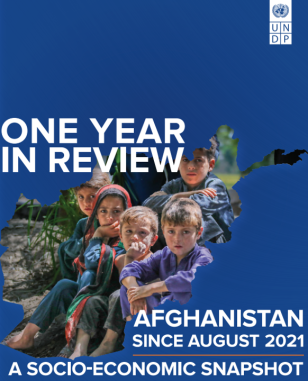Afghanistan Since August 2021: A Socio-Economic Snapshot

Afghanistan Since August 2021: A Socio-Economic Snapshot
October 5, 2022
The Report – “Afghanistan Since August 2021: A Socio-Economic Snapshot” – provides an overview of the changes observed during the past year. Severe disruptions, the lingering effects of the COVID-19 pandemic and drought in many parts of the country had affected economic activity and livelihoods even before 15 August 2021. The GDP, already on a declining trend since 2009, contracted by 20 percent between 2020 and 2021 with an estimated loss of about US$5 billion in one year alone. The political shock in August 2021 precipitated a sharp contraction in the licit economy that was already in decline.
Within a single year, a decade’s worth of hard-won economic gains was wiped out. This staggering economic shock has resulted in near-universal poverty. Economic activities declined significantly as a result of the collapse of the financial and banking sectors, the layoff of government employees and the shrinking of private economic activities. The freeze on the foreign assets and the international sanctions have led to a severe liquidity crisis. Restrictions on deposit withdrawals and other transactions have forced business to use cash for domestic and hawala for international payments.
Numerous restrictions confine women to the home and prohibit them from entering De facto Authority buildings, and their presence in public spaces is broadly contested. Limitations on women’s economic participation will have a long-term impact on household well-being and the economy.
This review is produced by UNDP Afghanistan, drawing from a range of data sources. Reflecting the limited availability of public data, it draws on third-party data sources and coverage.

 Locations
Locations




